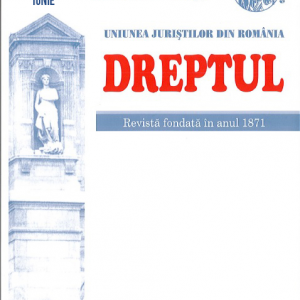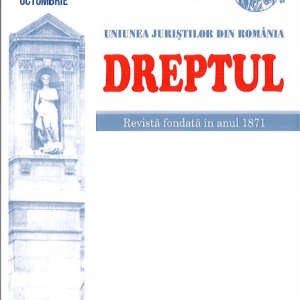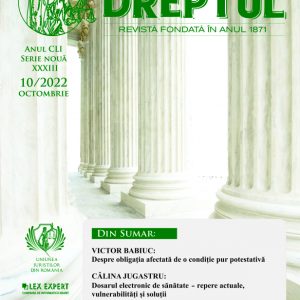-
 The aim of this paper is to identify how and if cultural diversity, as a fundamental and moral value of the EU, is effectively protected by EU law. I will start from the EU competences on cultural matters and try to find out if, while dealing with cultural issues, the EU is actually protecting its “unity without uniformity” and its “diversity without fragmentation”. The recent and stronger intervention of the EU in cultural matters, after Lisbon, raises questions as to its real aims, be it the building of a stronger and stronger “small common denominator” in cultural issues as well, by means of uniformity or the real protection of cultural diversity of its Member States.
The aim of this paper is to identify how and if cultural diversity, as a fundamental and moral value of the EU, is effectively protected by EU law. I will start from the EU competences on cultural matters and try to find out if, while dealing with cultural issues, the EU is actually protecting its “unity without uniformity” and its “diversity without fragmentation”. The recent and stronger intervention of the EU in cultural matters, after Lisbon, raises questions as to its real aims, be it the building of a stronger and stronger “small common denominator” in cultural issues as well, by means of uniformity or the real protection of cultural diversity of its Member States. -

-
 After the entry into force of the Civil Code (Law No. 287/2009 republished) on October 1st, 2011, which repealed the Family Code, and the corresponding amendment of Law No. 119/1996 concerning civil status acts, republished, the author examines in this study the legal provisions relating to the dissolution of marriage through divorce by administrative and notary procedure governed by Articles 375-378 of the new Romanian Civil Code.
After the entry into force of the Civil Code (Law No. 287/2009 republished) on October 1st, 2011, which repealed the Family Code, and the corresponding amendment of Law No. 119/1996 concerning civil status acts, republished, the author examines in this study the legal provisions relating to the dissolution of marriage through divorce by administrative and notary procedure governed by Articles 375-378 of the new Romanian Civil Code. -
 Pursuant to the entry into force of the Civil Code (Law no. 287/2009, republished) on October 1, 2011, which repealed the Family Code, has also duly amended Law no. 119/1996 on Civil status documents, republished, and also the entry into force of Law no. 134/2010 on the Code of Civil Procedure, republished, the author examines in this study the legal provisions relating to dissolution of marriage by divorce through court proceedings, making several references to the courts ? recent relevant case law. Thus, this study examines the legal provisions regulated by Articles 373-374 and Articles 379-381 of the Civil Code and Articles 914-934 of the new Code of Civil Procedure.
Pursuant to the entry into force of the Civil Code (Law no. 287/2009, republished) on October 1, 2011, which repealed the Family Code, has also duly amended Law no. 119/1996 on Civil status documents, republished, and also the entry into force of Law no. 134/2010 on the Code of Civil Procedure, republished, the author examines in this study the legal provisions relating to dissolution of marriage by divorce through court proceedings, making several references to the courts ? recent relevant case law. Thus, this study examines the legal provisions regulated by Articles 373-374 and Articles 379-381 of the Civil Code and Articles 914-934 of the new Code of Civil Procedure. -
 Preliminarily, the above study states the classification of interest in the Romanian Civil Law, according to the criterion of interest cause or in relation to the interest rate function. Further, the author reviews in detail - by comparing one to the other, as well - the moratory interest and the compensatory interest in the Romanian Civil Law (both the current Civil Code and the new Romanian Civil Code, published on July 24th, 2007, yet unenforced).
Preliminarily, the above study states the classification of interest in the Romanian Civil Law, according to the criterion of interest cause or in relation to the interest rate function. Further, the author reviews in detail - by comparing one to the other, as well - the moratory interest and the compensatory interest in the Romanian Civil Law (both the current Civil Code and the new Romanian Civil Code, published on July 24th, 2007, yet unenforced). -
 This study deals with the issue of forced distinctiveness, a legal mechanism that is essential for the matter of the trade mark law, but which is not generally thoroughly treated in the Romanian specialized literature, despite the rich case law it generates. Forced distinctiveness refers to the situation in which a sign that is likely to be represented graphically, but which initially lacks a distinctive nature, acquires distinctiveness following its use. Throughout the study, the author examines the legal nature of forced distinctiveness, from the point of view of the Romanian legislation and the European regulations, with references to the essential case law in this matter. Thus, in the first part, the author reviews the signs likely to acquire distinctiveness by use and in the second part, he examines the conditions of forced distinctiveness, as well as the criteria on which the assessment of the competent authority is based.
This study deals with the issue of forced distinctiveness, a legal mechanism that is essential for the matter of the trade mark law, but which is not generally thoroughly treated in the Romanian specialized literature, despite the rich case law it generates. Forced distinctiveness refers to the situation in which a sign that is likely to be represented graphically, but which initially lacks a distinctive nature, acquires distinctiveness following its use. Throughout the study, the author examines the legal nature of forced distinctiveness, from the point of view of the Romanian legislation and the European regulations, with references to the essential case law in this matter. Thus, in the first part, the author reviews the signs likely to acquire distinctiveness by use and in the second part, he examines the conditions of forced distinctiveness, as well as the criteria on which the assessment of the competent authority is based. -

-
 In this study, the authors examine 12 texts in which the new Romanian Civil Code (published on 24 July 2009, but not yet effective) explicitly provides for using the procedure of presidential ordinance in 12 clearly stated situations.
In this study, the authors examine 12 texts in which the new Romanian Civil Code (published on 24 July 2009, but not yet effective) explicitly provides for using the procedure of presidential ordinance in 12 clearly stated situations. -
 In this study, the authors examine 12 texts in which the new Romanian Civil Code (published on 24 July 2009, but not yet effective) explicitly provides for using the procedure of presidential ordinance in 12 clearly stated situations
In this study, the authors examine 12 texts in which the new Romanian Civil Code (published on 24 July 2009, but not yet effective) explicitly provides for using the procedure of presidential ordinance in 12 clearly stated situations -
 This study analyzes the scope of application of the indirect action and of the Paulian (revocatory) action both under the influence of the Civil Code of 1864, as well as under the influence of the current civil legislation (the Civil Code of 2009). The study follows the practical application, specifically, of these actions to a variety of rights which might be exercised or revoked through them, also making reference to the specialised French doctrine. There are analyzed the specialised doctrine of our country, both current and older, as well as some judgments delivered in this matter by the law courts. There have been distinguished the novelties brought by the Civil Code of 2009, in the end making a comparative enumeration of the changes brought to these institutions by the new civil legislation.
This study analyzes the scope of application of the indirect action and of the Paulian (revocatory) action both under the influence of the Civil Code of 1864, as well as under the influence of the current civil legislation (the Civil Code of 2009). The study follows the practical application, specifically, of these actions to a variety of rights which might be exercised or revoked through them, also making reference to the specialised French doctrine. There are analyzed the specialised doctrine of our country, both current and older, as well as some judgments delivered in this matter by the law courts. There have been distinguished the novelties brought by the Civil Code of 2009, in the end making a comparative enumeration of the changes brought to these institutions by the new civil legislation. -
 Tax domicile is defined in the Fiscal Procedure Code in order to provide solutions to some problems of administration of taxes, contributions and other amounts owed by taxpayers, especially those on the tax registration and establishing territorial competence of the fiscal bodies. Also, the tax domicile is important in a fiscal legal relationship, in the relationships of the taxpayer with the tax authorities in case the taxpayer may be represented by an empowered person. The taxpayer with no tax domicile in Romania, who has the obligation of submitting tax declarations to the tax authorities should designate an empowered person, with tax residence in Romania, with some exceptions recently regulated by the Fiscal Procedure Code. Based on the importance of the correct determination the taxpayer’s tax domicile, the study aims to examine the legal implications of tax domicile in the procedure for the administration of taxpayers.
Tax domicile is defined in the Fiscal Procedure Code in order to provide solutions to some problems of administration of taxes, contributions and other amounts owed by taxpayers, especially those on the tax registration and establishing territorial competence of the fiscal bodies. Also, the tax domicile is important in a fiscal legal relationship, in the relationships of the taxpayer with the tax authorities in case the taxpayer may be represented by an empowered person. The taxpayer with no tax domicile in Romania, who has the obligation of submitting tax declarations to the tax authorities should designate an empowered person, with tax residence in Romania, with some exceptions recently regulated by the Fiscal Procedure Code. Based on the importance of the correct determination the taxpayer’s tax domicile, the study aims to examine the legal implications of tax domicile in the procedure for the administration of taxpayers. -
 An application of the new technologies has involved a modern regulation, and the European states have received the electronic form of the patient file and have transposed it into a relatively recent regulation, and the novelty of the problems and the strict dependence on the IT platforms have led to successive changes in the legislation, at the level of several states. Adjustments, correlations, adaptations took place at the law-technology border, in relation to the „physical” reality of the national medical system. The electronic health file does not have the role of replacing the „classic” file, in written form. The latter remains in the circuit of the health system and preserves its usefulness, and the medical act is not conditioned by the existence of an electronic file. From the DES perspective and for the usefulness of the approach undertaken, some guarantees of the protection of private life and personal data were verified. The secrecy of the data concerning health is no longer just a „privacy” between the patient and a limited number of people, but is „displayed” on an IT platform, to which several natural persons/entities have access, the technical access key (matrix, user, password) is entrusted to the users through the administrator, given that the Internet is an environment susceptible to the generation of security breaches. Granting access to the entire electronic file implies that the medical staff is aware of all the information and all the health problems of a person. The secret becomes a „shared” one and the central problem (of the patient) is the control – over the private life, over their own personal data, over the information that, otherwise, they would not want to be disclosed in a virtual environment. At issue is not only a balance between public interest (public health) and private interest or between personality rights that can end up in a conflicting position. If it will be proven that the interest of the medical care coordination prevails over the patient’s acceptance, then the electronic file will remain outside the true control of its owner. But, if, on the contrary, the patient has the prerogative of control (with justified, strict, limiting exceptions), then his right to limit access to the file will be recognized.
An application of the new technologies has involved a modern regulation, and the European states have received the electronic form of the patient file and have transposed it into a relatively recent regulation, and the novelty of the problems and the strict dependence on the IT platforms have led to successive changes in the legislation, at the level of several states. Adjustments, correlations, adaptations took place at the law-technology border, in relation to the „physical” reality of the national medical system. The electronic health file does not have the role of replacing the „classic” file, in written form. The latter remains in the circuit of the health system and preserves its usefulness, and the medical act is not conditioned by the existence of an electronic file. From the DES perspective and for the usefulness of the approach undertaken, some guarantees of the protection of private life and personal data were verified. The secrecy of the data concerning health is no longer just a „privacy” between the patient and a limited number of people, but is „displayed” on an IT platform, to which several natural persons/entities have access, the technical access key (matrix, user, password) is entrusted to the users through the administrator, given that the Internet is an environment susceptible to the generation of security breaches. Granting access to the entire electronic file implies that the medical staff is aware of all the information and all the health problems of a person. The secret becomes a „shared” one and the central problem (of the patient) is the control – over the private life, over their own personal data, over the information that, otherwise, they would not want to be disclosed in a virtual environment. At issue is not only a balance between public interest (public health) and private interest or between personality rights that can end up in a conflicting position. If it will be proven that the interest of the medical care coordination prevails over the patient’s acceptance, then the electronic file will remain outside the true control of its owner. But, if, on the contrary, the patient has the prerogative of control (with justified, strict, limiting exceptions), then his right to limit access to the file will be recognized.
